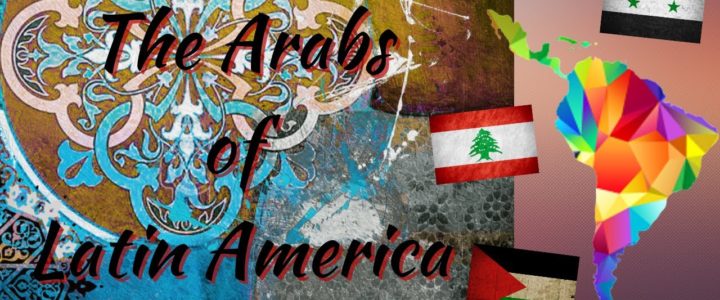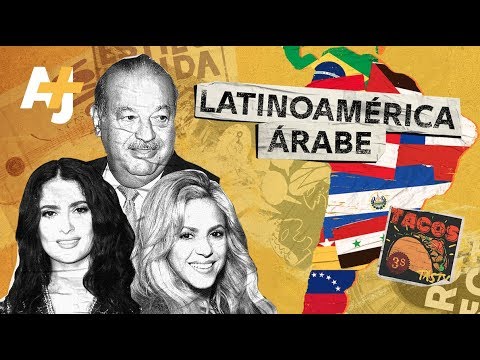
One has to remember that Latin/South America has a massive and prosperous Arab demographic, and this can affect Latin America views of the wars in the Mideast.
However, the Arab demographic is not necessarily monolithic.
First: Almost all of the Arabs in Latin/America are Christian. And they do not identify with the Islamic aspect of the Israel-Palestine conflict.
This distance derives from the Mideast history of their Arab ancestors, where there were instances of anti-Christian massacres such as in 1860, which drove many Christians out of Lebanon and Syria, to Latin America.
Source: Diatribe – The forgotten genocide
The slaughter of the Catholic Maronite Christians caused France, recalling its ancient role as protector of Christians in the Ottoman Empire which was established by treaty in 1523 to intervene [in 1860], landing troops in Lebanon to protect the Maronites.
Another source of Christian-Arab flight to Latin America was due to a fear that the Ottoman Empire would draft Christian men and put them in the front ranks of the battle as cannon fodder. So a lot of Christian families left to protect their sons.
Given these historical Muslim-Christian hostilities, when South American Arabs (who would be Christian) support the Palestinian cause, they probably would support the secular Fatah over the Islamic Hamas. They would avoid Islamic sympathies.
The only possible exception to this are the Palestinians in Latin America. (Click Here) to see some Palestinian-Chileans (who would be Christian) support the Intifada. Palestinian Christians in Latin America can be insane in their animus towards Israel. It makes no sense.
Second: It was easier for Christian Arabs to move to the West and assimilate in Latin America than for Muslims. There were links between the West and the Christians in the Holy Land. Such links could provide needed help. No such connections existed for Muslims who were on their own.
Third: Those relatively few Muslims who did immigrate to Latin America often converted to Catholicism or intermarried with local Christians in Latin America. The kids ended up being raised Christian, usually Catholic.
Fourth: Maronite Christians (affiliated with Catholicism), which form a large part of the Arab demographic in Latin America, have been historically hostile to Islam. As already noted above, on more than one occasion, Muslims tried to genocide the Maronite Christians in Lebanon. So there is no love lost between Maronites and Muslims.
Maronites tend to assimilate very well in Latin America, as they consider themselves to be a Western people. They rise to the top of society very fast. They are often neutral in Arab-Israeli struggles, and some of them can be pro-Israel.
Indeed, some of the Maronites see themselves as Phoenicians, not Arabs at all.
At the very least, the Maronites of Latin America have a moderating effect on the opinions of other Arab groups in Latin America.
Fifth: Syrian Arabs in Latin America (usually Eastern Christians) have other concerns, especially after the Syrian Civil War, when the remaining Christians in Syria came under threat of genocide.
Sixth: It is the Palestinian Latins (who are almost always Christian) who are a matter of concern. The Palestinian-Christians of Chile (Chilestinos) being an example.
Chile has the largest community of Palestinians outside the Mideast. However, the are NOT representative of Palestinians as a whole, since Chile’s Palestinians (Palestinos / Chilestinos) are taken, almost exclusively, from the Christian element.
The Palestinian Latins are noticeable in Honduras, El Salvador, and Chile.
Source: Police in Chile guard Jews after anti-Semitic attacks – JPOST
The Palestinian community is to Chile what the Jewish community is to the U.S.
– Gabriel Zalisnek, then president of Chile’s Jewish Federation
Palestinian Christians in Chile tend to be very intelligent, influential, hard working, and rich. But all their virtues disappear when it comes to the issue of Israel. They have a blind spot in that area. They have major outsize influence in Chile which, being a first world country now, has a major influence on Latin America.
Hostility from a poor country would not carry much weight, but from Chile, it can be worrisome. Some Jewish organizations have expressed grave concerns over the Palestinian-Christians in Chile, and their influence on government policy.
Posted on YouTube: July 9, 2020
The Palestinian-Latins and the Leftist governments in Latin America (such as Venezuela) are the issue, but overall the Arab-Latin Americans are not monolithic at all. There is some cause for concern, but not too much to worry about.
The issue is really Islam, and unfortunately, the penetration of Iranian influence, especially through HispanTV, a joint venture of Iran and Leftist Venezuela.
While Arab-Latin Americans may not be thrilled with Israel, some of them remember what the Muslims did to their ancestors — except for the Palestinian Latins (who are, ironically, mostly Christian). As noted, the Palestinian-Chileans are insanely anti-Israel and they have real clout in Chile.
The group holding back the flood of anti-Israel sentiment, however, are very pro-Israel Evangelical Christians in Latin America.
Posted on YouTube: 2023




